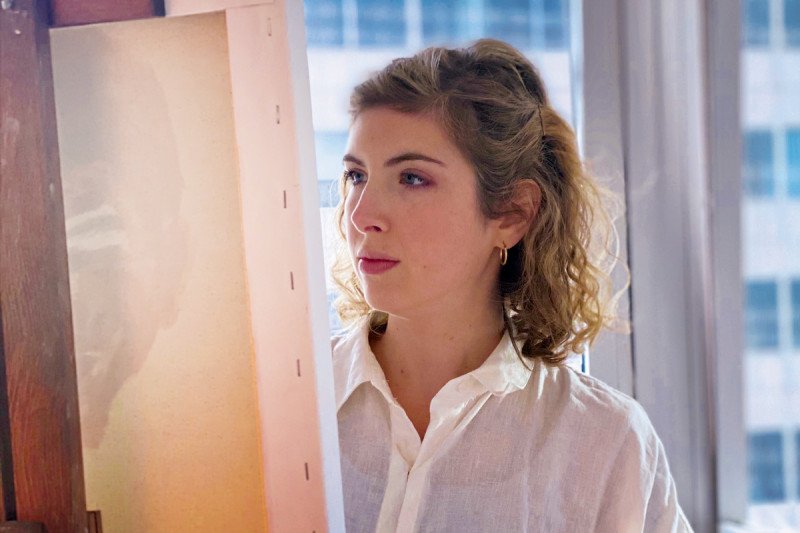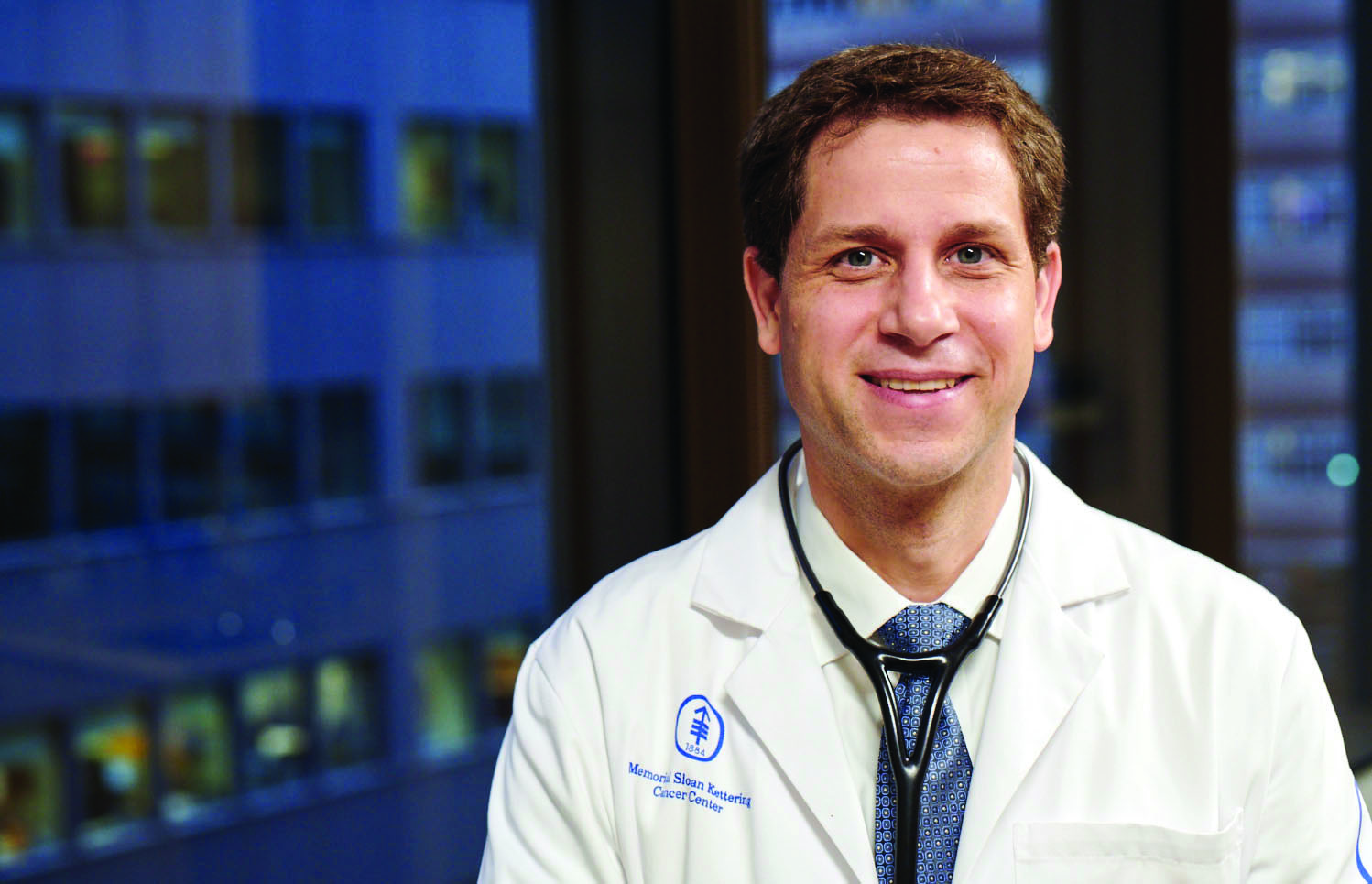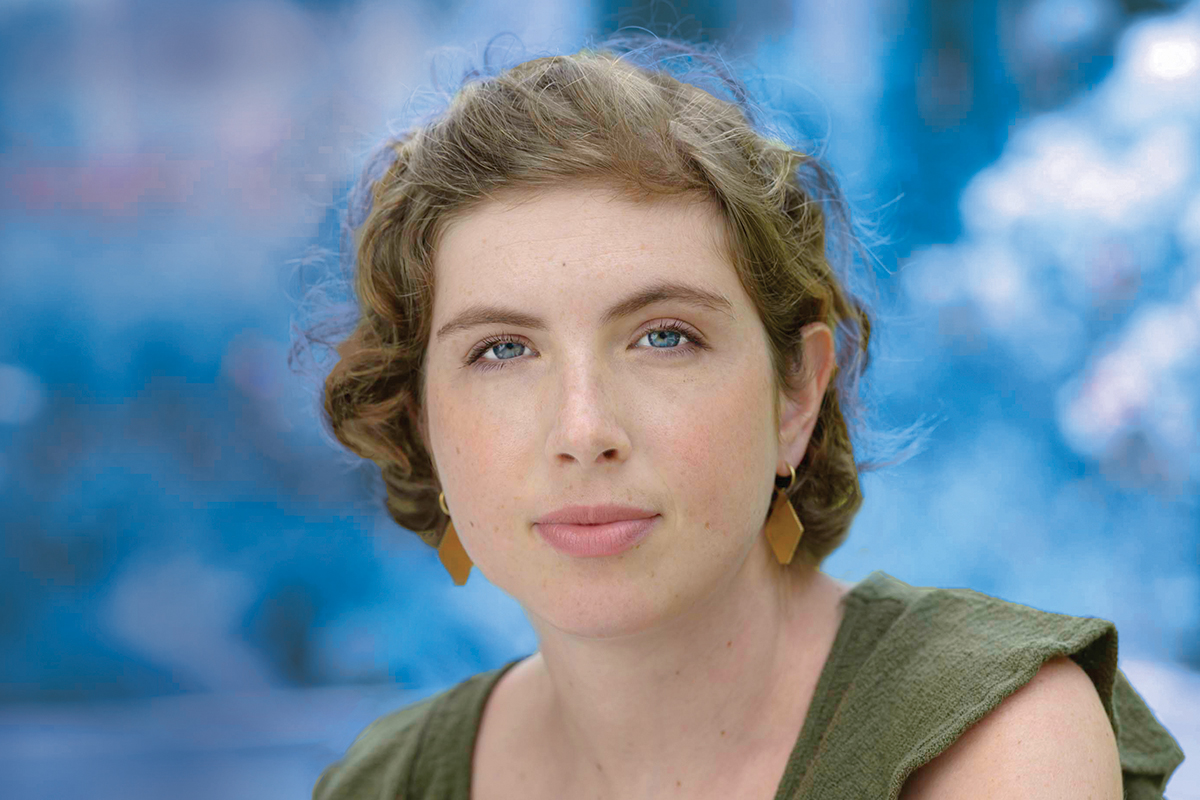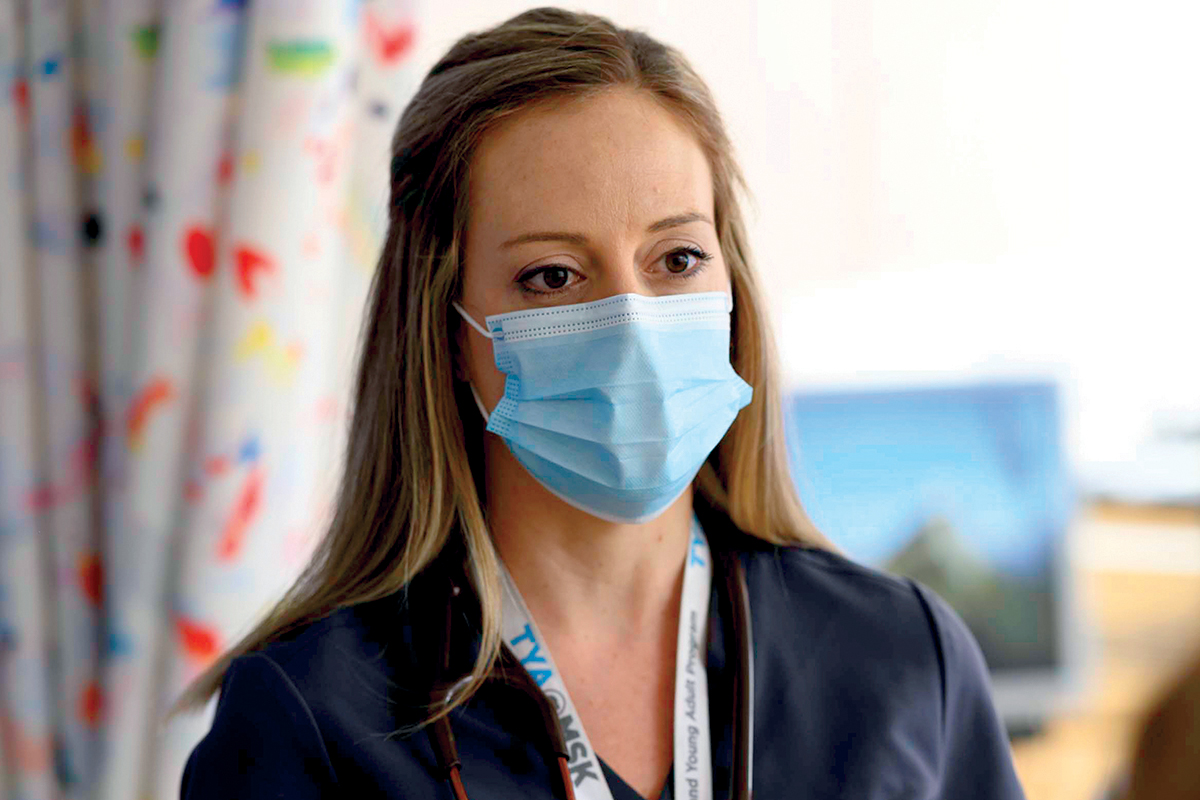
Tyler Wong’s girlfriend first sensed something was off.
In April 2020, the couple was cuddling at home when girlfriend Joanhy felt a lump in Tyler’s belly. Tyler felt it too. Thinking it could be a hernia, Joanhy asked the urologist she works for to examine Tyler. The doctor determined that it wasn’t a hernia and ordered more tests. Fearing it was something serious, Joanhy called Memorial Sloan Kettering. That’s when Tyler’s journey to diagnosis and treatment began.
Tyler, 25, of Bayside, New York, credits Joanhy with getting him to MSK. “She spearheaded everything,” he says.
Tyler was diagnosed with desmoplastic small round tumor, a rare form of sarcoma that often strikes boys and men between the ages of 10 and 30. “I had just finished school and started an apprenticeship as an electrician with Local Union 3,” he recalls. “My life had just started, and the diagnosis put everything on hold.”
The uncertainties that came with a life turned upside down were very unsettling. But at MSK, Tyler found answers — and hope. He met Emily Sarro, a nurse practitioner in MSK’s Adolescent and Young Adult (AYA at MSK) program who would help coordinate his care. In addition to explaining his treatment, which would include chemotherapy, immunotherapy, surgery, and likely radiation, Ms. Sarro told him about the wide variety of resources that he could take part in through AYA at MSK. Tyler knew he was in good hands. His interest was piqued when Ms. Sarro mentioned MSK’s Integrative Medicine Service. He already liked doing yoga and tai chi and was ready to give meditation a shot.
“Tyler was appreciative that people sat down to get to know him,” Ms. Sarro says. “He was eager to get the best care and to get started.”
Setting Out to Save Lives
Broadly, the survival rate for children with cancer has increased greatly in the past three decades. But for adolescents and young adults, there hasn’t been as much progress.
Paul Meyers, pediatric oncologist and Robbins Family Chair in Pediatrics, notes that there are key biological differences between these groups of patients and across cancers that are not yet understood.
“The most common form of leukemia in children is acute lymphocytic leukemia, which currently has a 90 percent cure rate,” says Dr. Meyers. “The adolescent and young adult population more commonly has acute myeloid leukemia, which is a harder disease to treat and has seen far less progress.” For sarcomas, according to Dr. Meyers, older age can often mean a worse prognosis.
But one thing holds true: MSK experts are committed to driving change and improving the outlook for adolescents and young adults.
William Tap, Chief of MSK’s Sarcoma Medical Oncology Service, and Julia Glade Bender, Vice Chair for Clinical Research in the Department of Pediatrics, are leading the mission forward.
“When I came to MSK, my priorities were to close the gap between pediatric and adult patients and to improve the experience for people in this age range,” says Dr. Glade Bender. She is internationally known for the development of new treatments for pediatric solid tumors.
Dr. Tap has spent ten years at MSK, making important discoveries to propel new treatments for adolescents and young adults with sarcoma. He says an approach to care must also be geared specifically toward these patients. “There are unique stressors in this age group that medicine does not fully understand or address properly,” he says. “Our goal is to provide well-rounded care that addresses their needs beyond medicine.”
The program unites experts across 16 specialties, including medicine, surgery, social work, sexual health, and survivorship. The goal is simple: provide the best care for MSK patients ages 15 to 39.

The Right Care at the Right Time
When she was 22, Danielle Leventhal noticed a pain in her left shoulder and chest that made it hard for her to breathe. An avid runner, Danielle was also having trouble keeping up with her father when they’d go jogging.
When the pain got more intense, the Westchester, New York, artist had a chest X-ray that showed a large mass. She then had a biopsy at a local hospital. It took weeks until she was diagnosed with pleomorphic liposarcoma in 2017; by that time, a softball-sized tumor was wrapped around her aorta and pushing on her heart and lungs. She had major surgery at another hospital, but since then Dr. Tap has overseen all of her cancer care — chemotherapy, radiation, and more.
Adolescents and young adults with cancer often receive delayed diagnoses and present with more-advanced disease, according to Dr. Glade Bender. Because cancer is very rare in this age group, patients may not think much of their symptoms, and local doctors may not suspect cancer because they see so few cases across their careers — or even none at all. And without expertise in this area, there’s also a gap in meeting their supportive needs, which could lead to worse outcomes for this vulnerable population, says Dr. Tap.
At Danielle’s first meeting with AYA at MSK, Ms. Sarro asked Danielle’s mom to step out of the room so she could speak with Danielle one-on-one. Danielle was grateful to have some private time with Ms. Sarro because she felt she had the opportunity to ask more of the hard-hitting questions with someone she related to. She wanted to learn as much as she could about her own long-term health and often didn’t have time to ask questions at her clinic visits, which were more focused on her disease and its current treatment.
“Danielle’s involvement in AYA at MSK has empowered her to be her own advocate and take charge of her treatment,” says Dr. Tap. “It has also helped her family allow Danielle to grow and become more independent while still being a significant part of this journey.”
This commitment is not unusual. Adolescents and young adults who come to MSK often participate fully in their own care, says John Healey, Chief of MSK’s Orthopaedic Service.
“Our patients take an active role in getting well again and staying healthy,” he says. He’s proud of the resilience he sees in them. “It’s just like when your child graduates or gets married. Helping these people find their way is hugely gratifying.”
After surgery, proton therapy, and chemotherapy, Danielle’s cancer went into remission. Unfortunately, it has returned twice. But at MSK, Danielle had more options and is now on a new chemotherapy regimen that has shown success in sarcoma tumors.
“Her involvement in AYA at MSK very much prepared her to tackle the next phase of her disease and its treatments,” Dr. Tap says.

Beyond Traditional Care
Cancer is tough, no matter the age. But adolescents and young adults face a whole host of unique challenges.
“Adolescent and young adult patients are much less likely to have alternative sources of financial support if they cannot work, and cancer treatment usually makes it impossible to continue working,” says Dr. Meyers. “They also are used to being on their own and typically have much less family support, which makes sticking to treatment difficult.”
Less family support can also mean that these young patients may experience depression, anxiety, and post-traumatic stress disorder, according to Alexandra Russo, a clinical social worker who is integral to the AYA at MSK care team.
Social workers provide age-appropriate counseling on how to handle life’s transitions in the midst of the unthinkable. They can also make referrals to other MSK specialized services, like social-work-led support groups or experts in the sexual health and fertility programs.
“These patients in particular can feel a little lost, and their caregivers have their own needs as well,” says Ms. Russo. “But we offer support and resources to meet so many of their needs.”
Tyler agrees: “At MSK, it’s not just about hitting the cancer with medicine. There’s a well-rounded approach, and Emily’s always just a phone call away.”
Philanthropy has been essential to the program’s inception and growth. A generous donation from the Kristen Ann Carr Fund has been instrumental. The fund honors the memory of a sarcoma patient at MSK.
Teen Cancer America, a nonprofit founded by legendary rockers Roger Daltrey and Pete Townshend of The Who, helped found The Lounge, a gathering spot at Memorial Hospital where young patients can relax, hang out, and catch up with friends.
The Lounge typically hosts group events that bring the community closer together. “Activities can range from video game tournaments to comedy shows to self-care workshops,” says Teen and Young Adult (TYA) program coordinator Lindsay Richards. The TYA arm of the AYA at MSK program provides the support services that complement each patient’s medical care. “Working with teens and young adults is meaningful because I can give them the space to forget about their challenges for a while,” says Ms. Richards.
But even before the COVID-19 pandemic made in-person socializing impossible, the TYA staff knew that a physical space was not enough for today’s youth. They helped develop The Lounge app, a secure place where MSK’s teen and young adult patients can connect with one another online.

Looking Ahead
AYA at MSK has big plans for the future: Program leaders regularly ask for feedback from patients to better respond to their needs, and the group has increased telemedicine appointments, which are clicking with today’s tech-savvy youth.
The future is bright for new treatments too. At MSK, there are now clinical trials just for adolescents and young adults with sarcoma — though these trials are still a rarity. These trials will help standardize care approaches for patients around the world.
But MSK doctors and researchers aren’t making advances on their own. It requires a united effort to move the needle and improve survival rates for teens and young adults with cancer.
“We already collaborate with the Dana-Farber Cancer Institute, and we’ve established collaborative efforts with Dutch colleagues at the Netherlands Cancer Institute and the Radboud University Medical Center. It’s very easy to join forces; everyone just wants to help,” Dr. Tap says.
“The seed has been planted,” adds Dr. Glade Bender. “And the cool thing will be to watch it grow.”



